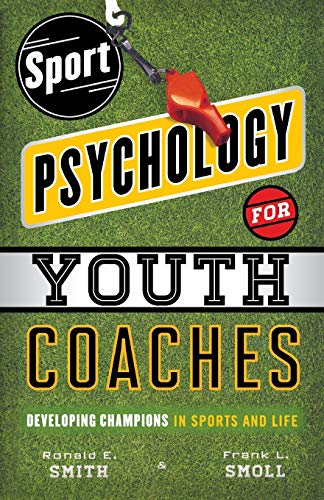Ronald E. Smith
Ronald E. Smith, Ph.D., is professor of psychology and director of the Clinical Psychology Training Program at the University of Washington. He has held a faculty position at Purdue University and visiting scholar appointments at Marquette University
... Read more
Ronald E. Smith, Ph.D., is professor of psychology and director of the Clinical Psychology Training Program at the University of Washington. He has held a faculty position at Purdue University and visiting scholar appointments at Marquette University, UCLA, the University of New Mexico, and the University of Hawaii. For 12 years, Dr. Smith directed a psychological skills training program for the Houston Astros professional baseball organization. Smith also served as Team Counselor for the Seattle Mariners and as a training consultant to the Oakland Athletics Baseball Club and to Major League Soccer. Smith is a fellow of the American Psychological Association and a past president of the Association for Applied Sport Psychology. He is the recipient of a Distinguished Alumnus Award from the UCLA Neuropsychiatric Institute for his contributions to the field of mental health. At the University of Washington, Smith has served as Head of the Social Psychology and Personality area and as co-director of the Sport Psychology graduate training program. He also chaired the President’s Intercollegiate Athletics Advisory Board, and he co-directed (with Frank Smoll) Husky Sport Psychology Services in the University’s Department of Intercollegiate Athletics. Smith has published more than 200 scientific articles and book chapters and has authored or co-authored 34 books on introductory psychology, personality, stress and stress management, sport psychology, and human performance enhancement. His books include Introduction to Personality: Toward an Integration (7th ed., Wiley, 2004), Psychological Skills in Professional Baseball (Houston Astros Baseball Club, 1993), and Psychology: The Science of Mind and Behavior (5th ed., McGraw-Hill, 2011).
Frank L. Smoll, Ph.D., is professor of psychology at the University of Washington. As a University of Washington faculty member, Smoll teaches courses in sport psychology, and he has served as Graduate Program Coordinator, Human Subjects Coordinator, and Co-Director of the Sport Psychology graduate training program. From 1993-1999, he co-directed (with Ronald Smith) a psychological skills training program for UW athletes (Husky Sport Psychology Services). He has published more than 130 scientific articles and book chapters, and he is co-author of 22 books and manuals, including Children and Youth in Sport: A Biopsychosocial Perspective (2nd ed., Kendall/Hunt, 2002), Sports and Your Child (2nd ed., Warde, 2005), and Guidelines for Coaching Excellence (2009, INDE). Smoll’s professional honors include election to fellow status in the following organizations: American Psychological Association, Association for Applied Sport Psychology (AASP), National Academy of Kinesiology. In 2002, he was the recipient of AASP’s Distinguished Professional Practice Award. Smoll was also named a Sports Ethics Fellow for 2008 by the Institute for International Sports. He is an AASP Certified Consultant and has been actively involved with local and national youth sport organizations. In collaboration with Ronald Smith, Smoll was the recipient of research grants from the National Institute of Mental Health and the William T. Grant Foundation. A major goal was to develop, test, and disseminate an educational program for youth sport coaches. This program, which is known as the Mastery Approach to Coaching, is the only scientifically validated coaching-education workshop that has been shown to have desirable effects on youngsters’ personal, social, and athletic development. The research was honored as one of the top 100 science-technology contributions in the history of the University of Washington in a volume entitled Pathbreakers: A Century of Excellence in Science & Technology at the University of Washington. More than 26,000 coaches have participated in some 500 workshops in the United States and Canada. Less
Frank L. Smoll, Ph.D., is professor of psychology at the University of Washington. As a University of Washington faculty member, Smoll teaches courses in sport psychology, and he has served as Graduate Program Coordinator, Human Subjects Coordinator, and Co-Director of the Sport Psychology graduate training program. From 1993-1999, he co-directed (with Ronald Smith) a psychological skills training program for UW athletes (Husky Sport Psychology Services). He has published more than 130 scientific articles and book chapters, and he is co-author of 22 books and manuals, including Children and Youth in Sport: A Biopsychosocial Perspective (2nd ed., Kendall/Hunt, 2002), Sports and Your Child (2nd ed., Warde, 2005), and Guidelines for Coaching Excellence (2009, INDE). Smoll’s professional honors include election to fellow status in the following organizations: American Psychological Association, Association for Applied Sport Psychology (AASP), National Academy of Kinesiology. In 2002, he was the recipient of AASP’s Distinguished Professional Practice Award. Smoll was also named a Sports Ethics Fellow for 2008 by the Institute for International Sports. He is an AASP Certified Consultant and has been actively involved with local and national youth sport organizations. In collaboration with Ronald Smith, Smoll was the recipient of research grants from the National Institute of Mental Health and the William T. Grant Foundation. A major goal was to develop, test, and disseminate an educational program for youth sport coaches. This program, which is known as the Mastery Approach to Coaching, is the only scientifically validated coaching-education workshop that has been shown to have desirable effects on youngsters’ personal, social, and athletic development. The research was honored as one of the top 100 science-technology contributions in the history of the University of Washington in a volume entitled Pathbreakers: A Century of Excellence in Science & Technology at the University of Washington. More than 26,000 coaches have participated in some 500 workshops in the United States and Canada. Less




